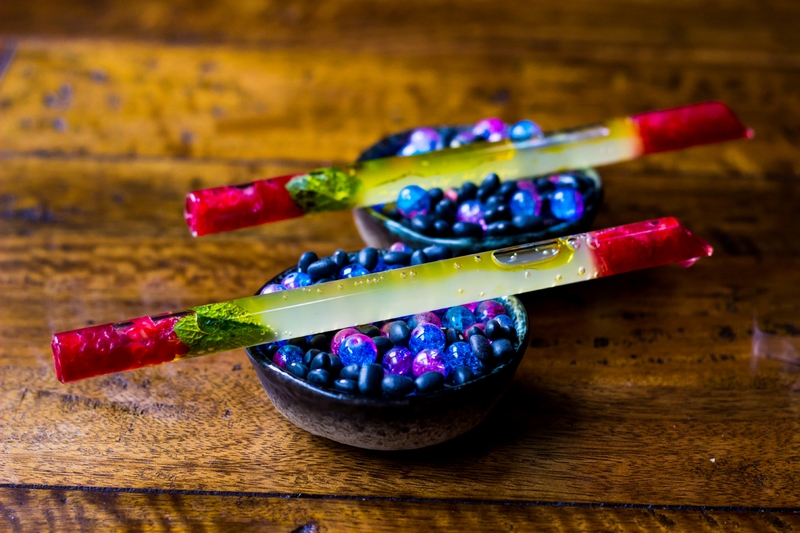Julia Bainbridge was very thoughtful when selecting the title of her upcoming book, Good Drinks: Alcohol-Free Recipes for When You’re Not Drinking for Whatever Reason. Cocktails without alcohol go by many names – mocktails, zero-proof or spirit-free drinks – and stakeholders are unable to agree on a name for the category. Bainbridge, a former Bon Appétit editor, simply wanted for her book to be a resource to anyone interested in the topic while shining a light on a category neglected in the craft cocktail scene.
“I kind of sidestepped that conversation in a way by calling them drinks. Drinks that are underrepresented and that serve perhaps underrepresented populations, and making it look like a party,” says Bainbridge.
At first, Bainbridge bristled at the thought of calling something a “mock” version of a classic cocktail. She eventually came around – one example being the Pimm’s Crown by Rob Brouse of Acadia in Chicago, Illinois – because it can help recreate part of the experience one gets from classic drinks. “There’s the alcohol factor, but remove that and think about whether they’re delivering on a balance of flavor or bitterness or whatever else. I believe that we can take information from the world of alcoholic beverages and use that in this realm.”
To write Good Drinks, Bainbridge drove across the entire US, from New York City to Bloomington, Indiana, to Portland, Oregon. Since she was looking to find drinks she really wanted to have in bars and restaurants, she decided to reach out to bartenders and cocktail professionals whose job it is “to make good, balanced beverages – no matter the alcohol content”. That meant some days she was on site at Death & Co’s Denver location learning how kefir whey can add body to a drink, or at the Los Angeles kitchen of author Gabriella Mlynarczyk learning about her love of all things aromatic.

In California, she tasted drinks made with umeboshi vinegar and tomato water, while in Missouri she tried the Shiso Spritz, a tea made with shiso leaves, a syrup made from melon rinds, wrestling pink-brown mixture that turns a rich magenta with the addition of citric acid.
Bainbridge’s timing is just right. The non-alcoholic beverage category has experienced significant growth over the past few years, with Nielsen naming low and no-alcohol options as a top alcohol trend for 2020. Bainbridge believes the growth comes from several factors, including Americans who are increasingly waking up to some of the dangers of alcohol, and that consumers are increasingly more attuned to wellness – including sugar and calorie consumption – but also the mental health aspects linked to regular drinking. “Since our parents’ generation, the stigma [surrounding mental health] has decreased,” Bainbridge said. “I think people are more aware of how alcohol affects their mental health and they may want to moderate for that reason, too.”
Millennials and Gen Z’ers are also plugged into world events and the anxiety it brings in a way previous generations have never been before – which may contribute to the growing trend of drinking less. “I believe they’re looking for ways to find balance amid today’s global uncertainty. Alcohol is also expensive, and the share of millennials with zero dollars in savings is on the rise. We haven’t accumulated the wealth that our predecessors did, by this point. And now, with Covid and the ensuing economic crisis, that’s all the more accurate.”
During this spring’s lockdown, she heard of many people making use of that time to explore not drinking for extended periods. She thinks that it was the perfect time to try it out, “because there’s no social pressure to deal with, right, because there’s no socializing!”
Bainbridge, who currently does not drink alcohol, doesn’t write about her relationship to it in the book for several reasons, including wanting it to be a resource for more than just sober people. “It’s not that I have shame around having a complicated relationship with alcohol. I just didn’t think it needed to be here because it is not a book exclusively for sober people. It’s a celebration of all this delicious stuff for people who want it, and there are lots of those people who want it for various reasons.”
She determined her own alcohol consumption was a problem she put a stop to, but she wants others to be free to define what is a problem for themselves. “Alcohol was negatively impacting my life. I wasn’t making the same kind of decisions when drinking that I would like to in my sober life. I definitely abused this substance for a long time, and removing it was important to my health and happiness.”
She’s not anti-alcohol – she just wants drinkers to realize there’s an entire unexplored world out there. “This book just celebrates all the delicious stuff there is to drink that doesn’t have alcohol for those who are not drinking it, may that be at all, tonight, this month, whenever, for this round, whatever.”
guardian.co.uk © Guardian News & Media Limited 2010
Published via the Guardian News Feed plugin for WordPress.


